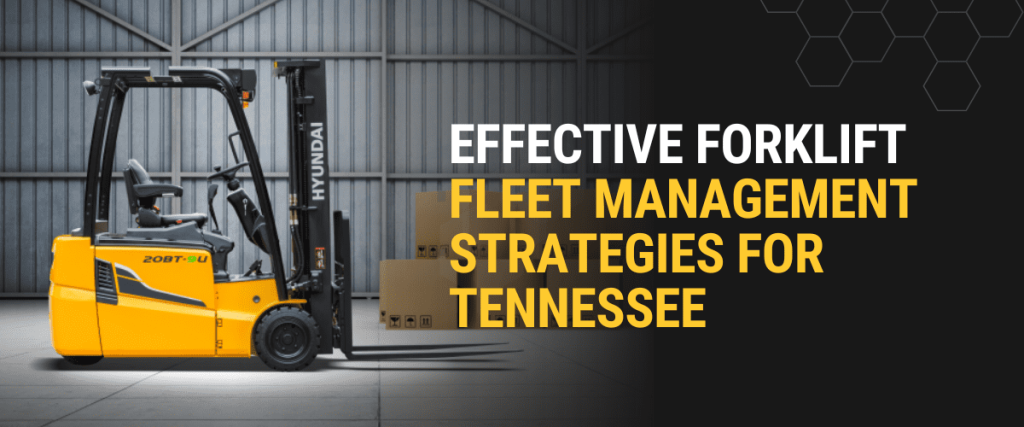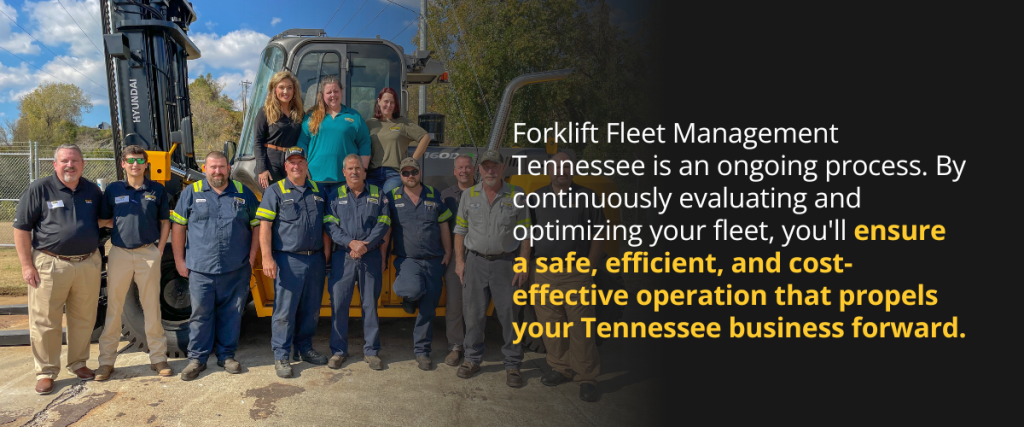
Effective Forklift Fleet Management Strategies for Tennessee

For businesses in Tennessee, a well-oiled forklift fleet is the backbone of efficient warehousing and material handling. But managing a fleet can feel like navigating a logistical maze. This article offers a roadmap to optimize your Tennessee forklift fleet, keeping costs down and productivity soaring.
Forklift Fleet Optimization
Right-Sizing Your Tennessee Fleet
The first step to efficient Tennessee forklift fleet management is ensuring you have the right forklifts for the job. Tennessee boasts a diverse industrial landscape, from lumberyards to distribution centers. Consider:
- Terrain: Will your forklifts operate indoors, outdoors, or both? For uneven surfaces, consider rugged large, pneumatic tire forklifts from Hyundai or rugged Combilift models.
- Application: Do you need an electric cushion-tire; diesel/LPG, cushion or pneumatic-tire forklift?
- Capacity: Matching the capacity to your typical loads prevents overloading, a safety hazard, and a strain on your fleet.
By analyzing your needs, you can avoid under- or over-utilizing forklifts, optimizing your investment.
Keeping Your Fleet Running Smoothly
Regular maintenance is crucial for successful Tennessee forklift fleet management. Here’s how to stay ahead of the curve:
- Planned Maintenance: Schedule preventative maintenance (PM) according to manufacturer recommendations. Consider partnering with a Tennessee forklift dealer who offers PM contracts for expert servicing.
- Daily Inspections: Encourage operators to conduct pre-shift inspections as mandated by OSHA. Train them to identify potential issues and report them promptly.
- Telematics Systems: Consider installing telematics systems that track engine health, fuel consumption, and impact events. Early detection of problems minimizes downtime and costly repairs.

Cost-Saving Measures for the Volunteer State
Tennessee businesses are known for their resourcefulness. Here are some strategies to keep your forklift fleet budget trim:
- Operator Training: Investing in comprehensive forklift operator training reduces accidents, fuel waste, and unnecessary wear and tear.
- Standardization: Maintain a standardized fleet with similar models to simplify parts inventory and streamline maintenance procedures.
- Fuel Efficiency: Explore alternative fuel options like propane or electric forklifts, depending on your application, for potential long-term fuel cost savings.
Tennessee Forklift Fleet Planning: Gearing Up for the Future
Planning for your Tennessee forklift fleet’s future is essential to avoid unexpected disruptions. Here’s how to plan for your Tennessee forklift fleet’s future:
- Optimize Fleet Utilization with Telematics: Implement a comprehensive telematics system that goes beyond basic GPS tracking. These advanced systems provide valuable insights into:
-
- Forklift Usage: Monitor real-time location, activity levels, and idle time to identify underutilized equipment. This data can help you optimize deployment and potentially reduce the number of forklifts needed.
- Machine Health: Gain access to diagnostic reports that flag potential maintenance issues before they escalate into costly breakdowns. Proactive maintenance extends the lifespan of your fleet and to minimize downtime.
- Operator Performance: Monitor operator behavior and identify opportunities for training to improve safety and fuel efficiency
- Replacement Planning: Track forklift age and usage patterns to anticipate replacements. Consider partnering with your dealer for trade-in or upgrade options.

Effective Forklift Fleet Management Practices
Implementing these strategies can help transform your Tennessee forklift fleet from a cost center to a competitive advantage. Here are some final takeaways:
- Focus on safety: Prioritize operator training and regular inspections to prevent accidents and costly downtime.
- Embrace technology: Utilize fleet management software and telematics for data-driven decision-making.
- Partner with local experts: Build a strong relationship with your local Thompson Lift Truck representative in Nashville for expert advice and service.
Remember, forklift fleet management is an ongoing process. By continuously evaluating and optimizing your fleet, you’ll ensure a safe, efficient, and cost-effective operation that propels your Tennessee business forward.
